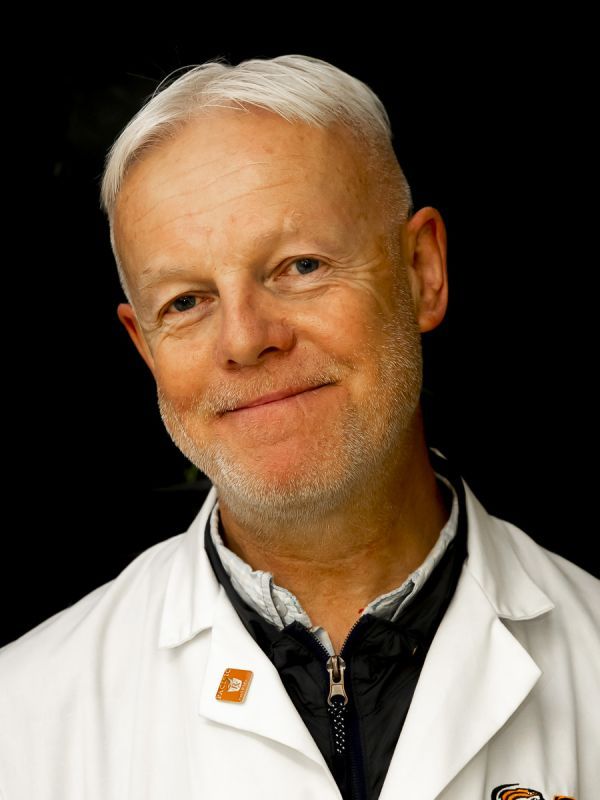
Robert Halliwell
At Pacific Since: 2002
Robert F. Halliwell, PhD earned a bachelor of science from University of Stirling, Scotland and his master of science from University of London. He earned his doctor of philosophy from University of Dundee, Scotland. He completed post-graduate training in neurological science at University College London and in pharmacology at Ninewells Hospital and Medical School, University of Dundee.
Dr Halliwell was awarded training scholarships to Rockefeller University, New York, the University of London and Universidad Nacional Autónoma de México. Before coming to Pacific, he held a lectureship in Neuroscience at the University of Durham, England and a Post-Doctoral Research Fellowship at the University of California, Irvine.
His hobbies include learning the guitar as a left-hander, reading historical biographies, trail running and spending time with his family and friends.
BSc, University of Stirling, Scotland, 1983
MSc, University of London, England, 1985
PhD, University of Dundee, Scotland, 1992
PD Research Fellowship, University of California, Irvine, 1996-1999
Teaching Philosophy
"If I make it interesting and sometimes fun, we all learn together."
Courses
PHAR111 — Physiology & Pathophysiology
PHAR442 — Neuropsychiatry
PG220 — Pharmacology (DDS)
Research Summary
"Our lab is addressing the properties and potential value of neurons derived from a variety of human stem cells for studies in neuropharmacology and neurotoxicology; I have also published work in the history of medicine."
Primary Researchers
Robert F. Halliwell, PhD (Principal Investigator)
Leanne Coyne, PhD (Professor)
Hamed Salmanzadeh, PhD (Post-Doctoral Researcher)
William S. Cao, PhD (Post-Doctoral Researcher)
Research Interests
- Properties of neurons derived from stem cells
- Neurotransmitter receptors and ion channels
- History of medicine
Scholarly Activity
Salmanzadeh H and Halliwell RF Antiseizure properties of fenamate NSAIDs determined in mature human stem-cell derived neuroglial circuits. Frontiers in Pharmacology, 15:1385523. doi: 10.3389/fphar.2024.1385523 (2024).
Salmanzadeh et al., Neuropharmacology of human [TERA2.cl.SP12] stem cell-derived neurons in ultra-long-term culture for antiseizure drug discovery. Frontiers in Neuroscience – Translational Neuroscience. 17:1182720. (2023).
Sevak R, et al., Impact of a Neuropsychiatric Therapeutics Course and Case-Based Course on Pharmacy Students’ Mental Health Stigma. American J. of Pharmaceutical Education, https://doi.org/10.1016/j.ajpe.2023.100125 (2023)
Halliwell RF, et al., An Electrophysiological and Pharmacological Study of the Properties of Human iPSC-Derived Neurons for Drug Discovery. Cells; 10(8):1953. (2021).
Salmanzadeh et al., Adolescent Substance Abuse, Transgenerational Consequences and Epigenetics. Current Neuropharmacology; 19 (9):1560-1569 (2021).
Salmanzadeh H et al. Adolescent drug exposure: A review of evidence for the development of persistent changes in brain function. Brain Research Bulletin, 156, 105-117 (2020).
Khansari PS & Halliwell RF. Mechanisms underlying neuroprotection by the NSAID, mefenamic acid in an experimental model of stroke. Frontiers in Neuroscience. https://doi.org/10.3389/fnins.2019.00064 (2019)
Halliwell RF Electrophysiological properties of neurons derived from human stem cells and iNeurons in vitro, Neurochemistry International, 106: 37-47. (2017)
Cao WS, Livesey JC & Halliwell RF. An evaluation of a human stem cell line to identify risk of developmental neurotoxicity with antiepileptic drugs. Toxicology In Vitro, 29: 592-599 (2015).
Coyne L, Shan M, Przyborski SA, Hirakawa R & Halliwell RF. Neuropharmacological properties of neurons derived from human stem cells, Neurochemistry International, 59(3): 404-12 (2011).
C-R Pruell, A-H Maehle & RF Halliwell (Book). A Short History of the Drug Receptor Concept, Palgrave Macmillan. ISBN-13: 9780230554153. (2009).
Khansari PS & Halliwell RF. Evidence for Neuroprotection by the Fenamate NSAID, Mefenamic Acid. Neurochemistry International, 55: 683-688. (2009).
Harris D, et al., Selective influence on contextual memory: physiochemical properties associated with selectivity of benzodiazepine ligands at GABAA receptors containing the α5 subunit. J. Medicinal Chemistry, 51: 3788-3803 (2008).
Halliwell, RF. A Short history on the rise of the molecular pharmacology of ionotropic drug receptors. Trends in Pharmacological Sciences, 28 (5): 214 – 219 (2007).
Johnstone TBC, et al., Antibacterial quinolones yield novel anxiolytics. Nature Medicine, 10 (1): 31-32. (2004).
Maehle, AH, Prüll, CR & Halliwell, RF. The emergence of the drug receptor theory. Nature Reviews, Drug Discovery, 1: 637-641 (2002).


